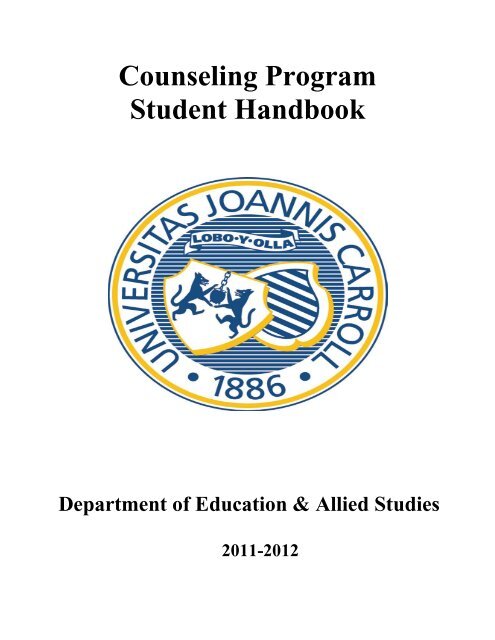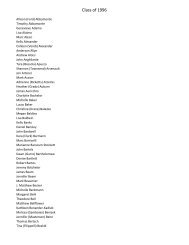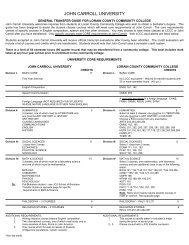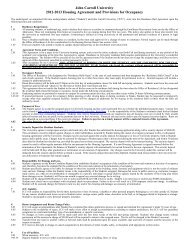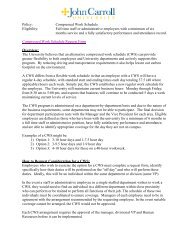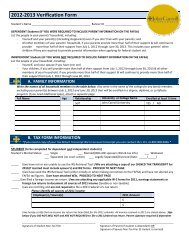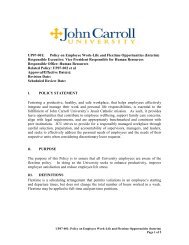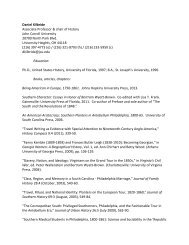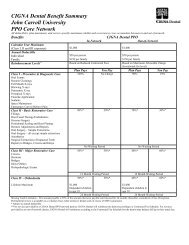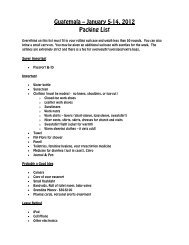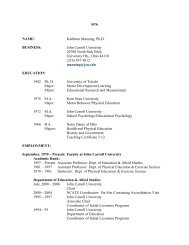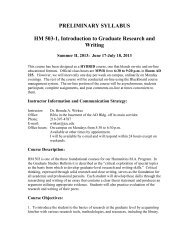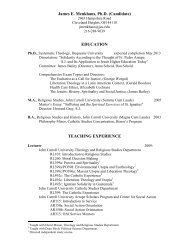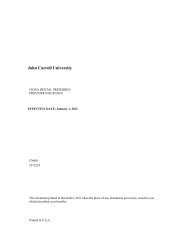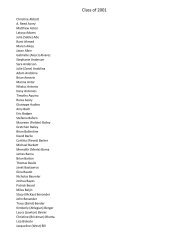Counseling Program - John Carroll University
Counseling Program - John Carroll University
Counseling Program - John Carroll University
You also want an ePaper? Increase the reach of your titles
YUMPU automatically turns print PDFs into web optimized ePapers that Google loves.
<strong>Counseling</strong> <strong>Program</strong>Student HandbookDepartment of Education & Allied Studies2011-2012
TABLE OF CONTENTSWelcome ……………………………………………………………………….4<strong>Counseling</strong> <strong>Program</strong> Overview ……………………………………………….. 4Graduate Studies Educational Philosophy ……………………………..4<strong>Counseling</strong> <strong>Program</strong> Mission Statement ……………………………… 4<strong>Counseling</strong> <strong>Program</strong> Goals …………………………………………… 5<strong>Counseling</strong> <strong>Program</strong> Objectives: Core Sequence …………………….. 5<strong>Counseling</strong> <strong>Program</strong> Objectives: Clinical Mental Health <strong>Counseling</strong> …6<strong>Counseling</strong> <strong>Program</strong> Objectives: School <strong>Counseling</strong> …………………..6<strong>Counseling</strong> <strong>Program</strong> Administrative Objectives ………………………..6Core <strong>Program</strong> Faculty …………………………………………………. 7Accreditation ……………………………………………………………8Admission Requirements ………………………………………………. 8Advisory Board ………………………………………………………… 10Minority Recruitment & Retention Policy ………………………………10<strong>Program</strong> Review & Evaluation Process ……………………………….…10<strong>Program</strong>s of Study ……………………………………………………………….10Clinical Mental Health <strong>Counseling</strong> ………………………………………11School <strong>Counseling</strong> ………………………………………………………..12<strong>Program</strong> Policies & Procedures …………………………………………………..14Student Conduct ……………………………………………………….….14Advising …………………………………………………………………..15Comprehensive Exams …………………………………………………....152
Required Student Portfolio ……………………………………………….16Student Academic & Professionalism Review ..………………………….18Student Prospectus ……………………………………………………......19Student Retention & Dismissal …………………………………………...19Right to Appeal an Academic or Dismissal Decision …………………….20Student Opportunities & Services ………………………………………………...20Professional Development Opportunities ………………………………....20Research and Study Opportunities ………………………………………...22Student <strong>Counseling</strong> Services ……………………………………………....22Career Planning & Placement ……………………………………………..23Appendix AAppendix BAppendix CAppendix DAppendix EReview of Student Progress & Retention ………………………...24Clinical Mental Health <strong>Counseling</strong> Student Prospectus …………..28School <strong>Counseling</strong> Student Prospectus …………………………...30Scheduling Timeline ………………………………………………33Course Descriptions ………………………………………………343
WELCOMEWelcome to the <strong>John</strong> <strong>Carroll</strong> <strong>University</strong> Counselor Education <strong>Program</strong>. We are pleased andhonored that you have chosen to join us as you begin this important part of your journey tobecome a counselor.The profession upon which you embark is a noble, challenging, and rewarding one. You willwear many hats: catalyst, advocate, facilitator, encourager, and teacher. You will encounterpeople whose abilities, cultures, beliefs, and values may be different from you own. What you dohave in common is your humanity. As you will discover over the course of your studies, whenanother human being entrusts you with his or her secrets, fears, frustrations, and joys it is anhonor. And you both will be transformed in the process.Today, you are taking the necessary first steps to acquire the knowledge and develop the skillsneeded to be an effective, competent counselor. But there’s more. A former member of ourcampus community, the Reverend Howard Gray, S.J., reminds us that Jesuit education isstructured ―to find meaning, to let meaning touch the heart, and to commit oneself through one’sprofessional competence to appropriate action for justice.‖ In the end, it is our hope that you willbecome men and women who lead and serve others.We look forward to working with you in the days ahead. May your studies and interactions withfaculty, fellow classmates, and clients help you find meaning and clarify your role as a counselorwho brings hope, justice, and healing to others.Graduate Studies Educational PhilosophyCOUNSELING PROGRAM OVERVIEWThe educational philosophy of Graduate Studies in the College of Arts & Science at <strong>John</strong> <strong>Carroll</strong><strong>University</strong> is congruent with the fundamental doctrine of the <strong>University</strong>’s Jesuit mission. TheDepartment of Education and Allied Studies has established for its programs four academicgoals, which are grounded in Jesuit ideology. These goals, which provide steady educationalguidelines in varied and ever-changing contexts, have been designed to: Provide professional education in a liberal arts context. Uphold traditional values, yet be responsive and sensitive to society’s changing needs. Focus on personal, as well as professional, development of the individual. Emphasize teaching anchored in both a strong research base and Jesuit educational ideals.<strong>Counseling</strong> <strong>Program</strong> Mission StatementThe mission of the <strong>John</strong> <strong>Carroll</strong> <strong>University</strong> Counselor Education <strong>Program</strong> is to createprofessional clinical mental health and school counselors who embody the Jesuit essence ofpersons for others and leaders in service. The program strives to offer a broad-based educationthat will prepare students to become competent and effective counselors who are also leaders andadvocates. In addition, the program promotes awareness and understanding of our multicultural,pluralistic, and highly technological society. Finally, the program promotes commitment to the4
8. Demonstrate the ability to select and evaluate assessment instruments for possible use withclients and/or students. (ED 530, CG 591/592, CG 596/CG598)9. Model legal and ethical understanding of the ASCA or ACA ethical standards. Demonstrateknowledge of the appropriate ethical code and of the ethical decision making process.<strong>Counseling</strong> <strong>Program</strong> Objectives: Clinical Mental HealthAfter completing this program, the student will be able to:1. Identify as a clinical mental health counselor who is knowledgeable about the history anddevelopment of the clinical mental health counseling profession, is aware of the challengesfacing the profession, and is prepared to advocate for the profession.2. Assess, evaluate, and diagnose clients using assessment instruments and the DSM-IV-TR.(CG 570, CG 571, CG 572, CG 592, CG 596)3. Determine, based on the assessment and diagnosis, an appropriate treatment plan for clients.(CG 573, CG 592, CG 596)4. Implement interventions and treatment plan, and continuously assess the effectiveness of theintervention. (CG 592, CG 596)<strong>Counseling</strong> <strong>Program</strong> Objectives: School <strong>Counseling</strong>After completing this program, the student will be able to:1. Identify as a school counselor who is knowledgeable about the history and development ofthe school counseling profession, is aware of the challenges facing the profession and is preparedto advocate for the profession.2. Plan a developmentally appropriate school counseling program that supports academic,personal/social, and career development. The program should be modeled on the ASCAstandards and should take into consideration the specific needs of a particular school setting.3. Communicate, collaborate and consult with school age students, their families,school staff, and community agency representatives to promote a safe,healthy, and effective learning environment.4. Implement a system of on-going program evaluation by establishing a framework for recordkeepingand continuous feedback from program stakeholders.<strong>Counseling</strong> <strong>Program</strong> Administrative ObjectivesStriving for educational excellence, the program coordinator, faculty, and professional staff have6
established the following administrative objectives for the <strong>Counseling</strong> <strong>Program</strong>:1. Maintain CACREP and NCATE accreditation, and the State of Ohio Counselor, SocialWorker and Marriage and Family Therapist Board and the Ohio Department of Educationapproval.2. Encourage contributions to the counseling profession through faculty research.3. Remain steadfast in efforts to promote diversity in the faculty as well as in the studentpopulation.4. Evaluate all aspects of the program on a regular basis and use the results of these evaluationsto strengthen the program.5. Ensure the availability of field placement sites and encourage job placements for programgraduates by creating and maintaining positive relationships with local agencies, schools andschool districts.Core <strong>Program</strong> FacultyCecile Brennan, Ph.D., PCC-S, LSCAssistant Professor<strong>Counseling</strong> <strong>Program</strong> Coordinatorcbrennan@jcu.eduDr. Brennan received her Ph.D. from Cleveland State <strong>University</strong>. She is a Professional ClinicalCounselor, a licensed School Counselor, and a graduate of the Cleveland PsychoanalyticCenter’s Postgraduate <strong>Program</strong> in Psychoanalytic Psychotherapy (PPP). She is active as both ascholar and a practitioner. Her scholarly interests are in the fields of ethics, counselor educationand the impact of society and culture on mental health. As a practitioner she concentrates onworking with families and children. Dr. Brennan is a member of several professionalorganizations and participates at national, regional and state conferences every year.Paula Britton, Ph.D., PCC-SProfessorClinical Mental Health <strong>Counseling</strong> Internship & Practicum Coordinatorpbritton@jcu.eduDr. Britton received a Ph.D. in <strong>Counseling</strong> Psychology and a M.A. in Counselor Education fromthe <strong>University</strong> of Akron. She is Professional Clinical Counselor, a psychologist, and a NationalCertified Counselor. Dr. Britton has extensive experience within the field and is active inconsulting, clinical practice, scholarly research, and publishing. Dr. Britton is involved in manyprofessional organizations and currently serves as Chapter Advisor to <strong>John</strong> <strong>Carroll</strong>’s Beta Chichapter of Chi Sigma Iota. Her areas of professional expertise include counselor supervision,HIV/AIDS, and complementary and alternative therapies.7
<strong>John</strong> Rausch, Ph.D.Associate Professorjrausch@jcu.eduDr. Rausch received the Ph.D. in Educational Psychology from Kent State <strong>University</strong>. He isactive in many professional organizations, including ACA, ACES, ASERVIC, OCA, AERA, andMWERA. Dr. Rausch's research interests include the social and emotional development ofchildren and adolescents, resiliency, identity development, shyness, and self-efficacy. He hasconducted research in adolescent group homes, juvenile justice facilities, alternative schools, anduniversity settings. Dr. Rausch is one of the research methodologists in the Department ofEducation and Allied Studies, and he is also the coordinator for graduate assistants in theDepartment.Nancy P. Taylor, Ph.D., PCC-SAssistant ProfessorSchool <strong>Counseling</strong> Internship & Practicum Coordinatorntaylor@jcu.eduDr. Taylor received the Ph.D. in <strong>Counseling</strong> Psychology from Kent State <strong>University</strong>. She is aProfessional Clinical Counselor and a licensed psychologist. Dr. Taylor is active in severalprofessional organizations, including APA, ACA, OCA, and NCOCA. Her areas of professionalexpertise include wellness issues, chemical dependency, career counseling, spirituality, andworking with children and teens. For several years she was associated with the ClevelandHeights/<strong>University</strong> Heights city schools in the areas of counseling and chemical dependencyprevention. Prior to becoming a full-time faculty member, Dr. Taylor served as an AdjunctAssistant Professor in the Department of Education and Allied Studies while on the professionalstaff of the <strong>John</strong> <strong>Carroll</strong> <strong>University</strong> <strong>Counseling</strong> Center. Her research interests include forgivenessand the use of outcome measures in clinical training and supervision.Accreditation<strong>John</strong> <strong>Carroll</strong> <strong>University</strong> is fully accredited by the North Central Association of Colleges andSecondary Schools. The Department of Education and Allied Studies is accredited by theNational Council for Accreditation for Teacher Education and is approved by the Ohio StateDepartment of Education. The Master’s Degree in Clinical Mental Health <strong>Counseling</strong> isapproved by the State of Ohio Counselor, Social Worker, and Marriage and Family TherapistBoard, and accredited by the Council on Accreditation of <strong>Counseling</strong> and Related Educational<strong>Program</strong>s (CACREP). The School <strong>Counseling</strong> <strong>Program</strong> is accredited by the National Council forAccreditation for Teacher Education and by the Council on Accreditation of <strong>Counseling</strong> andRelated Educational <strong>Program</strong>s (CACREP), and is approved by the State of Ohio Department ofEducation.Admission RequirementsStudents applying for admission to either the Clinical Mental Health or School <strong>Counseling</strong><strong>Program</strong> must have:8
An undergraduate degree together with advanced undergraduate coursework (12-18semester hours) in the social and behavioral sciences, or teaching licensure isrequired. Applicants who do not have prerequisites for specific graduate courses willbe required to make up deficiencies. An undergraduate cumulative GPA of at least 2.75 (4.0 scale). A satisfactory score on the Miller Analogies Test (MAT) or the Graduate RecordExam (GRE). Three letters of recommendation from persons familiar with the applicant’s academicwork, professional work, vocational commitment, and suitability for the role ofcounselor are required. Ideally, these letters will come from former professors and/oremployers who can comment on the suitability of the applicant for graduate study. A letter of intent from the applicant outlining career objectives and goals. The lettershould be 400-600 words in length. It will be evaluated for content and grammaticaland mechanical correctness. Evidence of work or volunteer experience.Applicants must participate in an on-campus interview process which will include: A writing sample written in response to a provided writing prompt. An individual interview. A group interview.The on-campus group interviews are schedule during each semester. Applicants will be notifiedof the date when they apply. The GRE or MAT score, letters of recommendation, letter ofintention, and summary of experience should be submitted to the Office of Graduate Studies,College of Arts and Sciences. No application will be evaluated until all of the materialslisted above along with a Graduate Application form and appropriate official transcriptsare submitted.Application to the program closes on August 1 for the fall semester, December 1 for the springsemester, and May 1 for the summer session.The application material will be evaluated by the admissions committee. Possessing theminimum admission requirements, e.g. a 2.75 GPA, does not guarantee admission to the<strong>Program</strong>.Because of the interpersonal nature of the counseling profession, all students, even thoseapplying as transient students, must be interviewed by a faculty member. Enrollment as atransient student is not guaranteed to all applicants. In addition, all students, including transientstudents, must meet all course prerequisites and must be eligible for enrollment in a master’sprogram.It should be noted that the program is not intended to supplant personal psychotherapy. A copyof retention policies is available in the Counselor Education <strong>Program</strong> office. These policiespertain specifically to this program and exceed the College of Arts and Sciences requirements.9
Advisory BoardThe <strong>Counseling</strong> <strong>Program</strong> is advised by individuals involved in either school or clinical mentalhealth counseling. The Board meets at least twice a year. Input from the Board is used to informthe planning process of the <strong>Program</strong> and to ensure that the <strong>Program</strong> is meeting the needs of theareas school and agencies.Minority Recruitment & Retention PolicyThe Department of Education and Allied Studies at <strong>John</strong> <strong>Carroll</strong> <strong>University</strong> values educatingteachers, counselors, school psychologists, administrators, and health professionals who reflectthe rich diversity of people in our country. In addition, the department recognizes there is acritical need in our nation’s schools, mental health systems, and allied health programs forminority professionals. Toward this end, the department works actively to recruit minoritystudents with academic and professional potential into its undergraduate and graduate programs.The department seeks to accomplish this by establishing effective strategies for reaching out tominorities and by providing a range of incentives to attract minority students. This policysupports the department’s long term strategic goal of intensifying its commitment to increasingminority enrollment in undergraduate and graduate education programs.The Department of Education and Allied Studies at <strong>John</strong> <strong>Carroll</strong> <strong>University</strong> recognizes that tosuccessfully prepare minority students for professional roles as teachers, counselors, schoolpsychologists, administrators, and health care workers, it has a responsibility that extends beyondrecruitment. The department is committed to fostering minority student retention over thebreadth of its undergraduate and graduate programs. The department seeks to achieve this goalby marshaling the human and financial resources necessary to facilitate this type of success.<strong>Program</strong> Review & Evaluation ProcessEvaluation is an integral component of the program. All plans, operations, procedures, andperformances are systematically reviewed and evaluated at regular intervals by faculty and otherprofessionals who are involved with the program. Students also participate in the evaluativeprocess by completing questionnaires after each academic course and each clinical trainingexperience. Current and former students’ suggestions and comments about the program arewelcomed on an informal basis as well, through communications with faculty members and/orthe <strong>Program</strong> Coordinator. Finally, counseling professionals in the field—including schoolpersonnel, agency personnel and on-site supervisors—also contribute assessments of theprogram. All input and data collected from these varying sources—if found to be feasible—isexamined, explored, and utilized to strengthen the program. Copies of these evaluations may beexamined by contacting the program coordinator and making a request to do so.PROGRAMS OF STUDYThe counselor education program contains two programs of study: Clinical Mental Health<strong>Counseling</strong> and School <strong>Counseling</strong>. While the programs are distinct, they do share many coursesin common since both programs are accredited by CACREP which requires all students to study10
the eight core counseling areas.CLINICAL MENTAL HEALTH COUNSELINGThe Master of Arts in Clinical Mental Health <strong>Counseling</strong> consists of 60 semester hours ofgraduate studies and is designed to meet the academic requirements of the State of OhioCounselor, Social Worker, and Marriage and Family Therapist Board for the licensesProfessional Counselor (PC) and Professional Clinical Counselor (PCC). The program isdesigned to meet the needs of the part-time student while also accommodating full-time study.Counselors licensed as PCC’s function at an independent practice level, which allows them todiagnose and treat mental and emotional disorders without supervision. Additionally, with thesupervision designation, they may supervise other counselors. Counselors licensed as PCCs maymaintain a private practice.If an applicant already has a master’s degree in counseling or school counseling and is justseeking licensure as a clinical mental health counselor, it is possible to be admitted to a postmaster’slicensure program. Contact the program coordinator for more information.Students must bear in mind that academic requirements are only part of the overall licensurerequirements, which also include an application procedure, state examinations, and verifiedclinical work experience. These licensure requirements are met after the conferral of the M.A.degree in Clinical Mental Health <strong>Counseling</strong>.Required CoursesCore SequenceOrientation to Clinical Mental Health <strong>Counseling</strong> (3 hrs.) CG 500Human Growth and Development (3 hrs.) CG 505Research Methods for <strong>Counseling</strong> & Mental Health CG 509Professionals (3 hrs.) or Research Methods (3hrs) ED 502Tests & Measurements (3 hrs.) ED 530Career Development & Vocational Appraisal (3 hrs.) CG 531Group Dynamics, Processing, and <strong>Counseling</strong> (3 hrs.) CG 535<strong>Counseling</strong> Theory (3 hrs.) CG 561<strong>Counseling</strong> Techniques CG 562Diversity Issues in <strong>Counseling</strong> (3 hrs.) CG 563Clinical SequencePsychopathology (3 hrs.)CG570Evaluation of Mental and Emotional Status (3 hrs.) CG 571Diagnosis of Mental and Emotional Disorders (3 hrs.) CG 572Methods of Intervention, Prevention, and Ethics (3 hrs.) CG 573Treatment of Mental and Emotional Disorders (3 hrs.) CG 57411
Field Experience SequencePracticum in Clinical Mental Health <strong>Counseling</strong> (3 hrs.) CG 592Internship in Clinical Mental Health <strong>Counseling</strong> I (3 hrs.) CG 596Internship in Clinical Mental Health <strong>Counseling</strong> II (3hrs.) CG 596BElectives (9 hrs.)Nine hours of electives must be approved by the advisor and include courses related to thestudent’s professional work. Courses are to be selected from among graduate offerings inappropriate departments. Specialty areas are available in chemical dependency andpsychoeducational testing, among others.The student must apply for Practicum (CG 592) and Internship (CG 596) in Clinical MentalHealth <strong>Counseling</strong> by October 1 for the spring semester; by March 1 for the fall semester.Practicum (CG 592) and Internship (CG 596) are not available in the summer session.Ordinarily, CG 592 followed by CG 596 are the final courses in the student’s program. Siteplacements are subject to university approval. The university will not approve site placements insituations that violate human rights, demean human dignity, or operate according to principlesdirectly opposed to those for which the university as a Catholic institution must stand.The Master’s of Education degree is conferred upon the satisfactory completion of the abovecourses, a portfolio, and successful completion of the comprehensive examination. Thecomprehensive assessment requirement is satisfied through successful completion of theMaster’s Comprehensive Examination.SCHOOL COUNSELINGThe School <strong>Counseling</strong> <strong>Program</strong> is a 48 semester-hour graduate program designed to preparecandidates for licensure as counselors in an elementary, middle, or high school setting. Theprogram meets Ohio Department of Education, NCATE and the Council on the Accreditation of<strong>Counseling</strong> and Related Educational <strong>Program</strong>s (CACREP) standards for school counseloreducation programs.Candidates without a valid teaching license will be required to complete an additional sixsemester hours of course work (ED 503, ED 534). A one-year entry program, beyond theinternship requirement, under the supervision of a licensed counselor is also required.If an applicant already has a master’s degree and is just seeking licensure as a school counselor,it is possible to be admitted to a post-master’s licensure program. See the Graduate Bulletin, afaculty advisor, or the <strong>Program</strong> Coordinator for more information.Required CoursesCore SequenceOrientation to School <strong>Counseling</strong> (3 hrs.) CG 50112
Human Growth and Development (3 hrs.) CG 505Research Methods for <strong>Counseling</strong> & Mental Health CG 509Professionals (3 hrs.) or Research Methods (3hrs) ED 502Introduction, Survey & Awareness of ChemicalDependency (3 hrs.) CG 514Tests & Measurements (3 hrs.) ED 530Career Development & Vocational Appraisal (3 hrs.) CG 531Statistics ED 533Group Dynamics, Processing, and <strong>Counseling</strong> (3 hrs.) CG 535School <strong>Counseling</strong> <strong>Program</strong> Design & Consultation (3hrs.) CG 538<strong>Counseling</strong> Theory (3 hrs.) CG 561<strong>Counseling</strong> Techniques CG 562Diversity Issues in <strong>Counseling</strong> (3 hrs.) CG 563Candidates who do not hold a valid teaching license must also take:Orientation to the Educational Environment ED 503Learning-Teaching ED 534Field Experience Sequence :Practicum in School <strong>Counseling</strong> (3 hrs.) CG 591Internship in School <strong>Counseling</strong>, I (3 hrs.)CG 598AInternship in School <strong>Counseling</strong>, II (3 hrs.)CG598BElectives:Electives must be approved by the advisor and include courses related to the student’sprofessional work. Courses are to be selected from among graduate offerings in appropriatedepartments. Specialty areas are available in chemical dependency and psychoeducationaltesting, among others.Candidates who wish to become licensed as school counselors in Ohio must complete Practicum(CG591) and Internship (CG 598 A/B) at a school site acceptable to <strong>John</strong> <strong>Carroll</strong> <strong>University</strong> withthe approval of the school system involved. The one semester Practicum consists of 100 hours,40 hours of which must be in direct counseling of students. The Internship consists of 600contact hours over a minimum of one calendar school year. At least 240 of the intern’s 600-hourrequirement shall be in direct counseling service to children under the supervision of a certifiedschool counselor at the internship site as well as the supervision of the university’s internshipcoordinator. Practicum and Internship are not offered during the summer.Applications for the Internship must be submitted no later than November 1 for the springsemester or April 1 for the fall semester. The intern must register for CG 598A and CG 598B,complete a detailed case study and presentation, and demonstrate progressive attainment of skillsand experience commensurate with what would be expected of a counselor in practice.Students are responsible for securing their own professional liability insurance prior toparticipating in these courses. Consider obtaining insurance through the American School<strong>Counseling</strong> Association.13
Candidates are carefully reviewed in their work and evaluated during their entire internshipexperience. A successful final evaluation is a necessary prerequisite for endorsement of theintern for licensure. The candidate must also successfully pass all applicable sections of thePRAXIS Assessments for licensure as a school counselor. Submission of logged contact hoursduring Practicum and Internship is required for graduation.The Master’s of Education degree is conferred upon the satisfactory completion of the abovecourses, a portfolio, and successful completion of the comprehensive examination. Thecomprehensive assessment requirement is satisfied through successful completion of theMaster’s Comprehensive Examination. The Master’s Comprehensive Examination is taken priorto the Internship placement.PROGRAM POLICIES & PROCEDURESWhat follows are some of the major policies and procedures specific to the <strong>Counseling</strong> <strong>Program</strong>.The Graduate Studies Bulletin, available online at http://www.jcu.edu/graduate/bulletin10-12/,contains more details about all of the policies of the graduate school. Students are encouraged toreview the Graduate Bulletin as well as this Handbook in order to be fully informed about allrelevant policies.Student ConductAcademic Honesty: Students should refer to the Graduate Bulletin for a detailedexplanation of the policies related to academic honesty. In summary, students areexpected to do their own work. Students who are caught committing an act of plagiarismor cheating are subject to penalties ranging from an ―F‖ on an assignment to expulsionfrom the <strong>University</strong>.Email Address & Blackboard: Students are expected to regularly check their JCU emailaccount and, if required by their professor, know how to access material placed onBlackboard. If students need help with any technological issue, they can contactInformation Services at http://www.jcu.edu/is/student/index.htmPunctuality/Attendance/Class Participation: Students are expected to arrive for classon time, attend all classes, complete all assignments and participate in class discussionsand activities. Advanced notice should be given to the class instructor of any plannedabsences. If it is necessary to be absent from class, it is the student's responsibility toobtain information that was covered, and to make sure all assignments are turned in to theinstructor on time. Students are responsible for all information if a class is missed.Students may want to check their schedule for any employment or personal conflicts thatwould prohibit them from participating fully in the course. Students should not enroll ina class knowing in advance they will miss class sessions. If punctuality, attendance orclass participation becomes problematic, a Concern Conference will be scheduled.Use of Technological Devices: It is not appropriate to be texting, talking on the phone,using the internet or social media during class time. Students who engage in this14
Advisingbehavior are not exhibiting appropriate professional behavior. If the behavior persists pastan initial warning, a Concern Conference will be scheduled.Each student is assigned a faculty advisor upon admission to the <strong>Counseling</strong> <strong>Program</strong>. The roleand function of the faculty advisor is to sustain a working relationship with a student (advisee)through the duration of the student’s plan of study. The goal of the relationship is the successfulcompletion of the program by the advisee. The advisee is responsible for scheduling a meetingwith his/her advisor early in the first semester of enrollment to plan the student’s course of study.Concerns related to academic and personal adjustment may be discussed at this time. A writtenprospectus is kept on file after this meeting. In subsequent semesters, regular meetings withone’s faculty advisor are recommended to determine needs, suggest improvements, and developinternship possibilities. It is the responsibility of the advisee to maintain regular contact withhis/her faculty advisor. The faculty meet during the fall term to review the progress of students inthe program. Following the meeting, students who in the view of the faculty are having difficultyare sent a letter informing them of the concern.Comprehensive ExamThe final examination requirement for the Master’s Degree in Clinical Mental Health or School<strong>Counseling</strong> is satisfied through successful completion of the Master’s ComprehensiveExamination. The Master’s Comprehensive Examination must be successfully completed prior tothe student’s counseling internship placement.School <strong>Counseling</strong> students who enrolled in the <strong>Counseling</strong> <strong>Program</strong> prior to August 2010 havethe option of taking the multiple-choice exam or a written exam administered by the Departmentof Education & Allied Studies. If a school counseling student elects to take the written exam,s/he needs to meet with the <strong>Program</strong> Coordinator to discuss this option.Examination Description: The Master’s Comprehensive Examination, the CounselorPreparation Comprehensive Exam (CPCE), assesses the student’s overall knowledge ofcounseling. It consists of 160 multiple choice questions. The examination incorporatesthe eight core content areas with 20 questions each, covering professional orientation,research and evaluation, group work (dynamics, processing, and counseling), appraisal ofthe individual, the helping relationship (including theory as well as methods andtechniques of counseling), human growth and development, social and culturalfoundations, and life span and career development. The exam has been created by theResearch and Assessment Corporation for <strong>Counseling</strong> (RACC), in conjunction with theCouncil for Credentialing and Education (CCE)—both affiliate corporations of theNational Board for Certified Counselors (NBCC). The CPCE exam is commonly used incounseling programs throughout the country and provides students with an opportunity tosynthesize their knowledge while also preparing for the licensing exams which they willneed to take upon graduation.Eligibility Requirements: The examination may be taken upon the completion ofacademic course work in the eight core areas of counseling. The examination must besuccessfully completed prior to the student’s counseling internship.15
Schedule of the Examination: The comprehensive examination is given two timesyearly, once each Fall and Spring semester. Dates of the examination for the current yearare announced well in advance, and it is the student’s responsibility to consult with theadvisor or <strong>Program</strong> Coordinator concerning the examination schedule. Students mustregister at the <strong>Counseling</strong> office at least one month prior to taking the examination. Theexam fee ($45:00 fee for the 2011-2012 school year, checks payable to <strong>John</strong> <strong>Carroll</strong><strong>University</strong>) must be paid at the time of registration.Procedures for Re-Taking the Examination: If a student is unsuccessful in passing theexamination on the first attempt, the examination may be repeated. However, before thestudent is eligible to repeat the examination, he or she must meet with his or her FacultyAdvisor to organize a plan of study to prepare for the repeated examination. This planmust be in written form and must be filed with the <strong>Program</strong> Coordinator.Scoring of the Examination: The Master’s Comprehensive Examination (CPCE) isnormed by students within <strong>John</strong> <strong>Carroll</strong> <strong>University</strong>’s <strong>Counseling</strong> <strong>Program</strong>. A passingscore is one that is at or within one standard deviation below the current mean. There isno penalty for guessing.Preparation for Success Completion of the Examination: To prepare for theexamination, students should review all notes, texts, and other readings from theappropriate academic course work. The Master’s Comprehensive Examination (CPCE)may contain questions that have not been addressed specifically in the individualstudent’s academic course work. Therefore, to be well prepared for the examination,students are encouraged to keep up with the current body of knowledge in the field. Thiseffort toward keeping current may be especially important if course work spans severalyears, as it does for many students. Students are encouraged to review current journals,and to keep current through reading, workshops, and small group discussion. Students arealso encouraged to review the Ethical Code (ACA or ASCA) as well as positionstatements of the ACA and or the ASCA and other professional associations. If studentsdesire further guidance about preparing for the exam, they should set up an appointmentwith their advisor.Required Student PortfolioStudents are required to complete a portfolio comprised of required documents, activities, andforms which will be presented during their final semester in the program. Each student mustmeet with their academic advisor to review these requirements and save them onto a CompactDisk (CD). The following pages outline the student portfolio checklist that will be used withyour advisor to verify successful completion of the portfolio requirement. Every student mustcomplete a portfolio and receive approval by Counselor Education faculty in order tosuccessfully graduate from the program. Directions for how to save each of these documents to aCD are provided below. NOTE: each document on the CD must be named according to the nameas it is listed on this document (i.e. the underlined words below indicate the name for each savedfile):16
Required Portfolio DocumentsIntroductory DocumentsProfessional Reflection Paper – The portfolio begins with an introduction into the student’spersonal reflections on becoming a professional counselor. This is a brief (2-3 page) paperthat summarizes the journey each student has taken in the program and how this experiencehas affected their development as a reflective practitioner.Professional Resume – This document is an updated and ―polished‖ resume that contains thestudent’s current and future (i.e. after graduation) contact information. This requirementserves as a way for students to highlight their accomplishments and achievements as theyprepare for their professional career in counseling.Evidence of Completing the Graduating Student Survey – Students must complete the OnlineGraduating Student Survey and print out (i.e. save to disk) proof of completion (found on thefinal page of the survey). This serves as documented participation of our students’ providingthe <strong>Program</strong> with feedback about their educational experiences. This is vital to ensure our<strong>Program</strong> continues to aim for the highest quality and standards.Selected Assignments From Core Classes Portfolio assignment from CG 500 or CG 501 Orientation to CMHC or School<strong>Counseling</strong> Portfolio assignment from CG 505, Human Growth & Development Portfolio assignment from CG 509, Research & Evaluation Portfolio assignment from ED 530, Tests & Measurements Portfolio assignment from CG 531 Career Development Portfolio assignment from CG 535, Group <strong>Counseling</strong> Portfolio assignment from CG 561, <strong>Counseling</strong> Theory Portfolio assignment from CG 562, <strong>Counseling</strong> Techniques Portfolio assignment from CG 563 Diversity Issues in <strong>Counseling</strong>Final Counselor Competency Scale (CCS) FormsThe final CCS forms from the following courses are required for your portfolio. Thisinstrument provides evidence of your growth and development in counseling skills,behaviors, and dispositions. Final CCS from Techniques of <strong>Counseling</strong> (CG 562) Final CCS from Practicum (CG 591 or CG 592) Final CCS from Internship (CG 596 or CG 598)Field Experience Documents Logs – Each student is required to submit signed hour logs from all semesters ofpracticum and internship. Internship Site Supervisor Final Evaluation Form – Students from all tracks are requiredto provide their final evaluation forms for all internship sites.17
Professional Development Activities Evidence of Attendance – Students must submit proof of their attendance at a state,regional, national, or international conference.OR Professional Membership – Students must submit proof of membership in at least oneprofessional counseling organization.Comprehensive Exam Forms Evidence of passing the CPCE – Students in all tracks must take and successfully passthe CPCE prior to completing their final semester of internship. Evidence of successfullypassing this exam must be provided. Evidence of passing the Praxis Exam must be provided by School <strong>Counseling</strong> students.only) – School <strong>Counseling</strong> studentsDirections for Loading Documents to the CD1. All documents should be saved to the CD as Word (.doc) or Adobe (.pdf) files.2. For those documents that are in ―hard copy‖ format (e.g., anything that is signed, lettersverifying the passing of an exam, evidence of membership, etc.), will need to be scanned.3. Scanned documents can be saved as PDF files on some computers (which would be ideal) oras images.4. If an image is saved, cut-and-paste that image onto a Word document.5. Once you have gathered all the necessary files, it is time to ―burn‖ (i.e. load) them to a CD. Ifyou require assistance with this process, you are encouraged to consult with your colleagues,your instructors, or tech-support personnel.6. Before submitting your final portfolio on CD, place the CD in another computer and ensurethat each file can be opened and that each file is legible. Your advisor must be able to openand read your portfolio.Student Academic & Professionalism ReviewAn important responsibility of the program faculty is the monitoring of student progressthroughout the program. While grades in courses and overall grade point average give a sense ofhow the student is progressing, it is sometimes necessary for the faculty to formally express theirconcern about a student’s progress. Faculty are required by the Council for the Accreditation of<strong>Counseling</strong> and Related Educational <strong>Program</strong>s (CACREP), The American <strong>Counseling</strong>Association (ACA), the American School Counselor Association (ASCA), and the licensingboard of the State of Ohio (OCSWMFT) to monitor students’ academic and professionaldevelopment. It is also important to note that a student can be dismissed from the program forfailing to uphold the required level of professionalism, and the professional dispositionsnecessary to be an effective and ethical clinical mental health or school counselor.In order to appropriately monitor students, and to provide them with clear feedback, thedepartment has created a process. See Appendix A. Whenever a faculty member or supervisorhas concern about student progress the process will be initiated. As can be seen from itsdescription, the process includes the student in each step. The intent of the process is to guidestudents in the development of the needed academic skills and professional dispositions.18
In addition to the formal process, it is important for students to understand that because they arein a profession which involves intensive personal contact and requires sound judgment, theyneed to remain open to feedback about how they are affecting others. Sometimes this feedbackcan be uncomfortable, but it is always given in the spirit of helpfulness.Student ProspectusStudents will fill out a prospectus during CG 500 or CG 501 and then review it with theiradvisor. The student prospectus forms are found in Appendix B for Clinical Mental Health<strong>Counseling</strong> students, and Appendix C for School <strong>Counseling</strong> Students. There is also ascheduling timeline in Appendix D which allows students to gain a clear visual understanding oftheir course of study.Student Retention & DismissalStudents should review the information and the policies in the Graduate Studies Bulletin,http://www.jcu.edu/graduate/bulletin10-12/ as well as the material in this Handbook.All graduate students are expected to achieve ―A‖ or ―B‖ grades consistently and maintain a 3.0grade point average. In addition to this standard, the following policies are upheld by the<strong>Counseling</strong> <strong>Program</strong>: A grade of ―C‖ or lower in CG 562, or a no-credit grade in CG 592 or CG596/CG598shall be considered a recommendation for dismissal from the program. In such casesdismissal may be activated without regard to the student’s overall grade point average. A grade of ―C‖ or lower in any two (2) other courses in the program shall also beconsidered a recommendation for dismissal from the program. In such cases, dismissalmay be activated without regard to the student’s overall grade point average. A student who receives any combination of two grades in the ―C‖ range or lower gradesat any course level receives a warning from the appropriate dean. Students so warnedmay continue their program only according to the specific conditions set by thedepartment and may be placed on academic probation by the dean in consultation withthe department. Students on probation are usually limited to one graduate course in the semesterimmediately following placement on probationary status. A student who has been placed on probation may be suspended from the program if he orshe performs below a 3.0 grade point average during the probationary semester and willnot be permitted to reapply for reinstatement until at least one full semester has elapsed. Conduct inconsistent with the obligations of a professional counselor shall be considereda recommendation for dismissal from the program. This may include such examples asconviction of a felony, substance abuse, violation of the counselor-client relationship,plagiarism, or any other violations of professional ethical standards as determined byACA’s Code of Ethics and Standards of Practice or Ohio state law. When a prospective counselor’s personal concerns, problems, and mental healthcompromise his/her professional abilities, it shall be considered a recommendation fordismissal from the program.19
Right to Appeal an Academic or Dismissal DecisionA student may appeal an academic or dismissal decision. The process for doing so is clearlyexplained in the Graduate Studies Bulletin available online at the Graduate Studies website:http://www.jcu.edu/graduate/home.htm. If students need assistance with this process, they shouldmake an appointment with their faculty advisor.Professional Development OpportunitiesSTUDENT OPPORTUNITIES & SERVICESChi Sigma Iota is an international honor society of counseling professionals andprofessionals-in-training. This organization is dedicated to excellence in scholarship,research, and clinical practice. Students are eligible for membership if they are enrolledin counseling programs leading to graduate degrees, have maintained at least a 3.5 gradepoint on a 4.0 scale, and have completed at least 9 semester hours of counseling courses.Those seeking membership who have already completed a Master of Arts degree incounseling must have obtained at least a 3.5 G.P.A. in their graduate program.Beta Chi is the local chapter of Chi Sigma Iota housed at <strong>John</strong> <strong>Carroll</strong> <strong>University</strong>. Dr.Paula Britton serves as Chapter Advisor.Membership in Chi Sigma Iota provides the following benefits: Networking. Members may find out about the latest developments in the field ofcounseling, including educational, internship, and work opportunities. Membersmay meet students and professionals specializing in similar areas of interest. Education. With a direct link to <strong>John</strong> <strong>Carroll</strong> <strong>University</strong>’s <strong>Counseling</strong> <strong>Program</strong>,members have ready access to information on course work and continuingeducation. Development. The Beta Chi chapter offers members the opportunity to planspecial events, host speakers, and compete for awards that foster scholarship andprofessional development.Students may obtain a membership application form for the Beta Chi Chapter of ChiSigma Iota from the <strong>Counseling</strong> <strong>Program</strong> office at <strong>John</strong> <strong>Carroll</strong> <strong>University</strong>. The annualfee for national membership in Chi Sigma Iota is $35.00. The membership fee to join ourlocal chapter, Beta Chi, is $10.00. Checks and applications may be mailed to: GraduateAssistant, Community <strong>Counseling</strong> <strong>Program</strong>, <strong>John</strong> <strong>Carroll</strong> <strong>University</strong>, <strong>University</strong> Heights,OH 44118.American <strong>Counseling</strong> Association (ACA) is a national professional counselingorganization that provides leadership, professional identity, legislative direction,continuing education, professional liability insurance, legal and ethical guidance,opportunities for professional development, and the monthly newspaper <strong>Counseling</strong>Today for its members. The American <strong>Counseling</strong> Association’s current identitystatement defines the ACA as a partnership of associations representing professional20
counselors who enhance human development. The ACA is organized into divisions andchapters that meet the needs of counselors in a broad range of specialties, in variousgeographic areas. The ACA offers reduced annual dues for students enrolled at least halftime in a college or university counseling program. Students may obtain informationregarding membership by contacting the ACA at 5999 Stevenson Avenue, Alexandria,Virginia, 22304-3300. The ACA may be reached by telephone at (800) 347-6647, by faxat (800) 473-2329, or at their official web site, www.counseling.orgAmerican School Counselor Association (ASCA) is a worldwide nonprofitorganization based in Alexandria, Va. Founded in 1952, ASCA supports schoolcounselors' efforts to help students focus on academic, personal/social and careerdevelopment so they not only achieve success in school but are prepared to lead fulfillinglives as responsible members of society. The association provides professionaldevelopment, publications and other resources, research and advocacy to more than13,000 professional school counselors around the globe. The ASCA offers reducedannual dues for students enrolled at least half time in a college or university counselingprogram. Membership information can be obtained at www.schoolcounselor.orgOhio <strong>Counseling</strong> Association (OCA) is the Ohio branch of the ACA. This professionalorganization provides news of continuing education opportunities, analysis of legislativeand licensure issues, and other information pertinent to the practice of counseling in thestate of Ohio. The OCA co-sponsors the annual All Ohio Counselors Conference inColumbus and faculty and students from <strong>John</strong> <strong>Carroll</strong> <strong>University</strong>’s <strong>Counseling</strong> <strong>Program</strong>frequently present workshops at this event. The OCA publishes Guidelines, a quarterlynewsletter for its members. Information regarding membership may be obtained from theOhio <strong>Counseling</strong> Association, 8312 Willowbridge Place, Canal Winchester, OH 43110.The OCA offers reduced annual dues for students. The OCA may be reached bytelephone at (614) 833-6068. You may also contact OCA at their official web site,www.ohiocounselingassoc.com.Ohio School Counselor Association (OSCA) Is an Ohio State organization based out ofNew Albany Ohio. Its purpose is to promote school counseling. It is committed to workwith parents, teachers, administrators, and other interested personnel in that endeavor. Inaddition, OSCA strives to lobby for legislation, which promotes school counseling,heightens public visibility of the counselor’s role, and builds a stronger professionalorganization by increasing membership and delivering services. Dr. Nancy Taylor of<strong>John</strong> <strong>Carroll</strong> <strong>University</strong>’s School <strong>Counseling</strong> <strong>Program</strong> currently is on the OSCA board asits professional development committee chair. The OSCA offers reduced annual dues forstudents. Membership information can be obtained at www.ohioschoolcounselors.orgNorth Central Ohio <strong>Counseling</strong> Association (NCOCA) is the local chapter of OCA,founded at <strong>John</strong> <strong>Carroll</strong> <strong>University</strong>. This professional organization meets the specializedneeds of counselors and students in both Cleveland and the immediately surroundingareas. Dr. Nancy Taylor of <strong>John</strong> <strong>Carroll</strong> <strong>University</strong>’s <strong>Counseling</strong> <strong>Program</strong> currentlyserves as NCOCA Chapter Advisor. A monthly newsletter announcing continuingeducation opportunities, special events, and related information is regularly mailed to all21
NCOCA members. Information regarding membership in NCOCA may be obtained fromthe <strong>Counseling</strong> office at <strong>John</strong> <strong>Carroll</strong> <strong>University</strong>.Professional Workshops, Conferences, and Training ExperiencesStudents are regularly notified of conferences, workshops, continuing educationopportunities, and other counseling-related activities available at local, state, and nationallevels. Such information is provided in the Graduate Newsletter, in direct mailings tostudents put out by the Beta Chi chapter of Chi Sigma Iota, and on the <strong>Counseling</strong><strong>Program</strong> bulletin board, located adjacent to the <strong>Counseling</strong> office. The <strong>Counseling</strong><strong>Program</strong> and <strong>John</strong> <strong>Carroll</strong> <strong>University</strong> sponsor an ongoing series of continuing educationworkshops for students and counseling professionals, which are approved for credit bythe Ohio Counselor and Social Worker Board. Students within the program receive a50% discount on workshop registration. Other institutions in the area that regularly offercounseling workshops, conferences, and training experiences appropriate for graduatestudents pursuing a counseling Master’s degree include: the Gestalt Institute ofCleveland, Cuyahoga Community College, the Mandel School of Applied SocialSciences, the Department of Psychiatry at the Case Western Reserve School of Medicine,Ursuline College, Notre Dame College, Akron General Medical Center, Child GuidanceCenters of Cleveland, the <strong>University</strong> of Akron, Kent State <strong>University</strong>, and many others.All students within the program are encouraged to take advantage of these professionalgrowth experiences.Students are encouraged to make presentations of their own by submitting proposals tothe annual Celebration of Scholarship sponsored by the Graduate School, and to variousprofessional organizations, in particular to the All Ohio Counselors’ Conferencesponsored by OCA and OSCA.Research and Study Opportunities<strong>Program</strong> faculty are actively involved in research and publications in the field and students havemany opportunities to join faculty members in these endeavors or to embark on their ownprojects. The <strong>University</strong> encourages faculty and student research and provides support, whichincludes, but is not limited to, data analysis and computer assistance. Dr. Rausch has a highdegree of expertise in research methodology and routinely provides consultation for students andfaculty within the <strong>Counseling</strong> <strong>Program</strong>.The Grasselli Library at <strong>John</strong> <strong>Carroll</strong> <strong>University</strong> houses comprehensive resources appropriate forscholarly inquiry, study, and research by both faculty and students. The library catalogs hundredsof books and journals from counseling-related disciplines, as well as an extensive collection ofACA publications. The library incorporates a computerized catalog system and also providescomputers that are conveniently located within the building, so that students and faculty mayaccess the Internet and a wide range of equally rich information sources.Student <strong>Counseling</strong> ServicesFaculty recognizes that a high degree of self-awareness is a key attribute of the effective and22
competent counselor. Students within the <strong>Counseling</strong> <strong>Program</strong> are encouraged to seek personalcounseling or psychotherapy so that they may increase their self-knowledge, as well as enrichtheir understanding of the counselor-client relationship and the counseling process itself. Theprogram itself is not intended to supplant personal therapy. Students may seek personalcounseling at the <strong>University</strong> <strong>Counseling</strong> Center. <strong>Counseling</strong> services for students within theprogram are always provided by licensed mental health professionals other than program facultyand students, in order to respect students’ privacy, maintain confidentiality, and to avoidpotential dual relationships.Career Planning & PlacementStudents who have completed nine credit hours within the <strong>Counseling</strong> <strong>Program</strong> are eligible toreceive comprehensive career counseling services, as well as job search assistance, at the Seniorand Alumni Career Services Office, located at 2563 South Belvoir Blvd., across from the main<strong>John</strong> <strong>Carroll</strong> <strong>University</strong> campus. Services offered include individual career counseling,assistance in clarifying goals, self-assessment and occupational assessment inventories, resumedevelopment, interview preparation, and access to many sources which detail job opportunitiesfor program graduates. In addition, the Career Services Office offers career workshops, careerdevelopment lectures, and career testing for individual courses within the program. Career fairsare also offered providing access to organizations and prospective employers. Students areencouraged to telephone 216-397-4237 to register for these services or to schedule anappointment with a career advisor.23
APPENDIX AREVIEW OF STUDENT PROGRESS & RETENTIONThe program faculty reviews the academic progress and personal professionalism of all studentseach year.Academic ReviewAccording to <strong>University</strong> policy, students who fail to maintain a 3.00 GPA are subject toacademic dismissal. In addition, the program stipulates that any student who receives a grade of―C‖ in CG 562 or a grade of ―C‖ in any two other classes is subject to dismissal.At any point in the student’s progress through the program a faculty member or supervisor mayrequest a Concern Conference based on the student’s academic performance. Potential areas ofconcern may involve the ability to research and write at a level appropriate for graduate school,the failure to demonstrate appropriate skills in critical thinking and analysis, or the failure toapply concepts learned in the classroom in a counseling setting.Personal Professionalism ReviewIn its code of ethics the counseling profession requires that students be assessed for theirpersonal professionalism as future licensed counselors and school counselors. From the timestudents enter the program they are expected to adhere to the ACA/ASCA code of ethics, and theethics code embedded in the counseling licensure laws of the state of Ohio.Students will be assessed in terms of criteria such as, but not limited to, the following:Effectiveness in close interpersonal relationshipsOpenness to self examination and commitment to self-growthWillingness to engage professional assistance to address personal characteristics whichinterfere with interpersonal relationships and the counseling processAbility to consider feedback non-defensivelyDemonstration of professionalism in the following areas: punctuality, maintainingconfidentiality, engaging the supervisory process, handling workplace conflict maturely,and careful maintenance of client records.Whenever a faculty member or supervisor feels a student is not progressing satisfactorily in thearea of personal professionalism a Concern Conference should be initiated. Failure tosuccessfully resolve the issues may result in the student’s dismissal from the program.Concern ConferenceA faculty member or supervisor may call a Concern Conference for students who areexperiencing academic difficulties or problematic behaviors, attitudes or dispositions. The focusof the meeting is to identify the problematic areas or behaviors and to generate particular actions24
that the student will perform by specific dates in order to remediate the point of concern. Theconference will be attended by the following individuals: the faculty member requesting theconference, the <strong>Program</strong> Director and the student.Step 1. A Concern Conference should result in the completion of the ConcernConference Policy Form (see below). A copy of the completed form will be given to the student,and a copy will be placed in the student’s departmental folder. This form will include the area(s)of concern and a plan for the remediation of these concerns.Step 2. The <strong>Program</strong> Director will ascertain whether the specified objectives have beenmet by within the allotted time period. If they have been met, the <strong>Program</strong> Director will place awritten note stating this in the student’s departmental folder. If they have not been met, theprocess will proceed to step 3.Step 3. An additional meeting will be attended by the student, the facultymember/supervisor complainant, the <strong>Program</strong> Director and the Chair of the Department ofEducation & Allied Studies. The student must bring to the meeting a written explanation of whythe agreed upon goals have not been met and an action plan to resolve the concerns. Followingthe discussion, a decision will be made on the part of the faculty whether to accept the student’splan as is, to accept it with written modifications, or to find it unacceptable. If the decision is toaccept, a clear timeline will be established. Monitoring the timeline is the responsibility of the<strong>Program</strong> Director. If the student’s plan is rejected, the student will not be allowed to enroll forany additional courses. The student is invited to re-apply to the <strong>Program</strong> after one academic yearhas passed. At that time, the student must show that the prior concerns have been resolved.25
Graduate ConcernConference RecordConcern Conference Policy Form___________________________Date of Conference___________________________Initiator of Conference___________________________Other Faculty Present___________________Student________________________Student Telephone/E-Mail_______________________Student AddressI. Areas of Concern: Please circle appropriate areas and provide explanation/description of areaof concern. .A. Language & Thinking Skills D. Professional Relationships1. Oral Expression 1.Effectiveness in Interpersonal Relationships2. Written Expression 2.Willingness to Engage Supervisory Process3. Reading Skills 3. Managing Conflict Effectively4. Critical Thinking/Analysis 4. Accepting Feedback Non-Defensively5. Other 5. OtherB. Professional Responsibilities/ Ethics E. Professional Competency1. Meeting Obligations 1. Knowledge2. Maintaining Client Confidentiality 2. Skills3. Maintaining Client Records 3. Clinical Experience4. Establishing Professional Boundaries 4. Other5. OtherC. Personal Growth & Development F. Graduate/Professional Behavior1. Openness to Self Examination 1. Punctuality2. Commitment to Self-Growth 2. Appropriate Appearance3. Willingness to Engage Professional 3. Notifies faculty/supervisorAssistance When Problem Emergesof absences, etc. in a timely manner4. Other 4. OtherExplanation/Description of Concern:26
APPENDIX BCLINICAL MENTAL HEALTH COUNSELINGSTUDENT PROSPECTUSThe prospectus should be filled out during a student’s first semester in the program.Students should make an appointment to discuss the Prospectus with their Advisor.A copy of the Prospectus should be given to the Advisor.Name:Date:<strong>Program</strong> Entry Year:I. Personal objective(s) in the Clinical Mental Health <strong>Counseling</strong> <strong>Program</strong>. Use additionalspace if necessary.II. Course of Study—60 Semester Hours RequiredRequired Core SequenceCourse #Semester/Year to be takenOrientation to Clinical Mental Health <strong>Counseling</strong> (3 hrs.) CG 500Human Growth and Development (3 hrs.) CG 505Research Methods for <strong>Counseling</strong> & Mental Health CG 509Professionals (3 hrs.) or Research Methods (3hrs) ED 502*Tests & Measurements (3 hrs.) ED 530Career Development & Vocational Appraisal (3 hrs.) CG 53128
Group Dynamics, Processing, and <strong>Counseling</strong> (3 hrs.) CG 535<strong>Counseling</strong> Theory (3 hrs.) CG 561<strong>Counseling</strong> Techniques CG 562Diversity Issues in <strong>Counseling</strong> (3 hrs.) CG 563Clinical SequenceCourse #Semester/Year to be takenPsychopathology (3 hrs.)CG570Evaluation of Mental and Emotional Status (3 hrs.) CG 571Diagnosis of Mental and Emotional Disorders (3 hrs.) CG 572Methods of Intervention, Prevention, and Ethics (3 hrs.) CG 573Treatment of Mental and Emotional Disorders (3 hrs.) CG 574Field Experience SequencePracticum in Clinical Mental Health <strong>Counseling</strong> (3 hrs.) CG 592Internship in Clinical Mental Health <strong>Counseling</strong> I (3 hrs.) CG 596AInternship in Clinical Mental Health <strong>Counseling</strong> II (3hrs.) CG 596BElectives (9 hrs. required)Nine hours of electives must be approved by the advisor and include courses related to thestudent’s professional work.III. Portfolio of Student WorkSee the description of student portfolio on page 16. The portfolio must be completed andsubmitted by the end of the final semester before graduation. Students enrolled after August,2011 must complete and submit a portfolio in order to graduate.IV. Comprehensive ExamSee the description of the comprehensive exam on page 15. Clinical Mental Health <strong>Counseling</strong>students must pass the comprehensive exam before enrolling in internship.29
APPENDIX CSCHOOL COUNSELING STUDENT PROSPECTUSThe prospectus should be filled out during a student’s first semester in the program.Students should make an appointment to discuss the Prospectus with their Advisor.A copy of the Prospectus should be given to the Advisor.Name:Date:<strong>Program</strong> Entry Year:I. Personal objectives in the School <strong>Counseling</strong> <strong>Program</strong>. Use additional space ifnecessary.II. Course of Study -- 48 Semester Hours RequiredRequired Core SequenceCourse #Semester/Year to be takenOrientation to School <strong>Counseling</strong> (3 hrs.) CG 501Human Growth and Development (3 hrs.) CG 505Research Methods for <strong>Counseling</strong> & Mental Health CG 509Professionals (3 hrs.) or Research Methods (3hrs) ED 502*Introduction, Survey & Awareness of Chemical30
Dependency (3 hrs.) CG 514Tests & Measurements (3 hrs.) ED 530Career Development & Vocational Appraisal (3 hrs.) CG 531Statistics ED 533Group Dynamics, Processing, and <strong>Counseling</strong> (3 hrs.) CG 535School <strong>Counseling</strong> <strong>Program</strong> Design & Consultation (3hrs.) CG 538<strong>Counseling</strong> Theory (3 hrs.) CG 561<strong>Counseling</strong> Techniques CG 562Diversity Issues in <strong>Counseling</strong> (3 hrs.) CG 563Candidates who do not hold a valid teaching license must also take:Orientation to the Educational Environment ED 503Learning-Teaching ED 534Required Field Experience SequencePracticum in School <strong>Counseling</strong> (3 hrs.) CG 591Internship in School <strong>Counseling</strong>, I (3 hrs.) CG 598A (ED 598A)Internship in School <strong>Counseling</strong>, II (3 hrs.) CG598B (ED 598B)ElectivesElectives must be approved by the advisor and include courses related to the student’sprofessional work.III. Portfolio of Student WorkSee the description of student portfolio on page 16. The portfolio must be completed andsubmitted by the end of the final semester before graduation. Students enrolled after August,2011 must complete and submit a portfolio in order to graduate.31
IV. Comprehensive ExamSee the description of the comprehensive exam on page 15. Clinical Mental Health <strong>Counseling</strong>students must pass the comprehensive exam before enrolling in internship.32
APPENDIX DSCHEDULING TIMELINEStudent:Advisor:Year Courses in Fall Courses In Spring Courses in Summer33
APPENDIX ECOURSE DESCRIPTONS(Courses Offered by the <strong>Counseling</strong> <strong>Program</strong>)CG 500. ORIENTATION TO CLINICAL MENTAL HEALTH COUNSELING 3 cr.Introduction to the professional, legal, and ethical responsibilities of community counselors,including professional roles and functions. Includes a course work overview, professional goalsand objectives, professional organizations, history and trends, preparation standards, andcredentialing. Methods of instruction include lectures, discussion, small group work,experiential exercises, videos, guest speakers, introduction to library and technology. Normallythe first course in the program sequence.CG 501. ORIENTATION TO SCHOOL COUNSELING 3 cr. Introduction to the professionof school counseling, including the historical, philosophical, ethical, and legal aspects ofcounseling within a school setting. Includes an overview of current issues and counselinginterventions that address the prevention of specific threats to normal development such asviolence, abuse, eating disorders, suicide, and attention hyperactivity disorder. Candidates begindevelopment of a professional portfolio which continues for the duration of their program track.CG 505. HUMAN GROWTH AND DEVELOPMENT 3 cr. Study of human growth anddevelopment throughout lifespan. Includes theories of learning, personality development, humanbehavior, as well as multicultural, ethical and legal considerations.CG 509 RESEARCH METHODS FOR MENTAL HEALTH PROFESSIONALS 3 cr.Overview of the principles and methods of quantitative and qualitative research and programevaluation for mental health professionals. The course emphasizes evidence/research-baseddecision making that would be used in community agencies and schools, including anintroduction to statistics used in research and practice. The course helps students learn toevaluate research reports, translate research into practice, and plan/conduct research studies andprogram evaluations to improve services. CG 509 is only for students in the Clinical MentalHealth <strong>Counseling</strong>, School <strong>Counseling</strong>, and School Psychology programs.CG 514. INTRODUCTION, SURVEY AND AWARENESS OF CHEMICALDEPENDENCY 3 cr. Designed to provide a working knowledge of the disease concept ofchemical dependency and its impact on its victims. Candidates will learn how chemicaldependency can be identified and treated. Prevention procedures and other issues related tochemical dependency.CG 531. CAREER DEVELOPMENT AND VOCATIONAL APPRAISAL 3 cr. Careerdevelopment throughout the life span and individual career decision-making theories. Careerassessment, appraisal, personality, and aptitude instruments and techniques for evaluatingindividuals relevant to choosing a career. Sources of career, educational, and labor marketinformation, including retrieval from computerized data sources and methods of setting up acareer-resources center. Career-counseling diagnosis and techniques, ethical practices, and anappreciation for the career concerns of special populations.34
CG 535. GROUP PROCEDURES 3 cr. Prerequisite: CG 561, CG 562. Types of groups, stylesof group leadership, and techniques used by group counselors. Group theories, the dynamics ofgroup processes, and the developmental stages of group counseling. Counselor skills in themanagement of group process from initial interview to termination as well as consultation andethical concerns in group procedures and the use of technology are included. Supervised groupsessions and debriefings comprise a major portion of the course.CG 538. SCHOOL COUNSELING PROGRAM DESIGN AND CONSULTATION 3 cr.Prerequisites: CG, 501, CG563. <strong>Counseling</strong> and guidance strategies for the school counselorwhich promote school and personal success and development in children and teenagers.Emphasis is placed on the skills necessary to assess students’ needs, design a program ofcomprehensive services, and coordinate, implement and evaluate the program’s activities. Thecourse also includes a thorough study of consulting models and strategies for the schoolcounselor’s articulation with school personnel, administrators, parents, and community agencies.CG 561. COUNSELING THEORIES 3 cr. Basic principles and theories of counseling withemphasis on counselor behavior and its effect on counseling outcomes. Includes philosophicbases of helping processes and counselor characteristics.CG 562. COUNSELING TECHNIQUES AND PRACTICE 3 cr. Prerequisite: CG 561 orpermission. Emphasis on the application of the theoretical principles involved in individual,group, and family counseling, consulting and psychotherapy, skill-building, and interviewing.Seminar format with role-playing, practical experience, basic interviewing, assessment, andcounseling skills. Course also covers DSM introduction, examination of counselor and clientcharacteristics and behaviors, and ethical considerations. Methods of instruction includelectures, experiential exercises, discussion, small group work, demonstrations, role-plays, andvideotaping with critiquing and audiovisual aides.CG 563. DIVERSITY ISSUES IN COUNSELING 3 cr. Builds the personal and professionaldevelopment of counseling practitioners through studying sociological, historical, philosophicaland psychological scholarship about the many cultures, races, ethnic groups and other minoritygroups that constitute American society. Considerations of racism, sexism, exceptionality andother diversity issues are applied to a variety of counseling, educational, and agency settings.CG 570. PSYCHOPATHOLOGY 3 cr. This course is designed to assist the counselingstudent in understanding psychological disorders. A thorough review of the major categories ofpsychopathology will be undertaken. This review will be contextualized by a discussion of therole of historical context and cultural differences in assessing individual behavior. The role ofcounseling in the treatment of mental and emotional disorders is explored.CG 571. CLINICAL EVALUATION 3 cr. Prerequisite: CG 562 and ED 530 or equivalent.Assessment procedures in diagnosis and treatment planning. Focuses on administering andinterpreting individual and group standardized (and un-standardized) tests of mental ability andpersonality measurement; also, factors that relate to specific populations, ethical and legalconsiderations, and historical perspectives.35
CG 572. CLINICAL DIAGNOSIS 3 cr. Prerequisite: CG 562. Includes appropriate use of thecurrent edition of the Diagnostic and Statistical Manual for Mental Disorders and othernosologies. Focuses on conducting mental-status examinations and on the framework foridentifying symptomology, etiology, and dynamics of mental and emotional disorders, issues ofdiversity, case conceptualization, assessment, diagnosis, ethical and legal considerations.CG 573. CLINICAL INTERVENTION, PREVENTION AND ETHICS 3 cr. Prerequisite:CG 562. Focuses on methods of intervention, including techniques used with diversepopulations and situations. Emphasis on counselor ethics and legalities. Includes clinicalsupervision, program development, and consultation.CG 574. CLINICAL TREATMENT METHODS 3 cr. Prerequisite: CG 562. Focuses ondiagnostic issues, case conceptualization, issues of diversity, developing and implementing atreatment plan, reporting and assessing progress of treatment, referral procedures, formulatingtimelines for treatment, and psychotropic medications and mood-altering chemical agents in thetreatment of mental and emotional disorders.CG 580. SPECIAL TOPICS IN CLINICAL MENTAL HEALTH COUNSELING 1-3 cr.In-depth study of a topic in workshop form.CG 581. INDEPENDENT STUDY 1-3 cr. Individual project under supervision. Approval ofprogram coordinator and appropriate dean required.CG591. SCHOOL COUNSELING PRACTICUM 3 cr. Prerequisites: CG 501, CG 561, CG562, CG 535. Supervised, applied counseling laboratory experience prior to internship andwithin an appropriate setting. Requires 100 hours of placement experience, including a minimumof 40 hours of direct, individual counseling and ten hours of group contact. Individual and groupsupervision, critique, ethical practices and consultation as well as audio and video taping.Candidates are required to maintain a logbook of contact hours.CG 592. CLINICAL MENTAL HEALTH COUNSELING PRACTICUM 3 cr.Prerequisite: CG 500, CG 561, CG 562, CG 535. 100 placement hours (40 in direct clientcontact). Application of appropriate treatment modalities and understanding of service provisionparadigms. Includes video and audio taping, individual and group supervision, case consultation,and legal and ethical issues. Employs the latest in instructional technology.CG 596A,B. CLINICAL MENTAL HEALTH COUNSELING INTERNSHIP 6 cr. (A) 3 infall; (B) 3 in spring. Prerequisite: CG 592. Placement under supervision in an appropriatesetting. 600 placement hours (240 in direct client contact, minimum 10 hours in groupcounseling). Regular on-campus seminar meetings. Includes client advocacy and outreach,referral processes, case conceptualization, and legal and ethical issues. Provides opportunities forusing assessment instruments, technology, and research in a field setting. Video and audio taping.Prior application and successful completion of Master’s Comprehensive Examination arerequired.CG 598A, B. SCHOOL COUNSELING INTERNSHIP 6 cr. (A) 3 in fall; (B) 3 in spring.36
Prerequisite: CG 591. Field placement under supervision. 600 service hours includes a minimumof 240 hours in direct, counseling contact with individuals and groups. Course work on campusexplores contemporary ethical, consultative, and counseling issues, techniques, and strategies;audio and videotaped session critiques; and the presentation of case studies. Application andsuccessful completion of the master’s comprehensive examination are required. Candidates arerequired to maintain a logbook of contact hours.COURSE DESCRIPTONS(Courses Offered by the Department of Education & Allied Studies)ED 502. RESEARCH METHODS 3 cr. Overview of the principles, strategies, andinstruments of quantitative and qualitative educational and counseling research and evaluation.The course emphasizes informed, research-based decision making at the classroom, school, andschool system levels, and in community agency settings. ED 502 will have one section forcommunity counseling and school counseling.ED 503. ORIENTATION TO EDUCATIONAL ENVIRONMENT 3 cr. Primarily a fieldexperience for Post-Bac. M.Ed. with licensure candidates, school-psychology and schoolcounselingcandidates who are not certified teachers. Placement will be in school settings acrossgrade levels.ED 530. TESTS AND MEASUREMENTS 3 cr. Prerequisite: CG 509 or consent of instructor.Basic knowledge and skills related to the selection and use of tests and measurements forindividuals planning careers in counseling or psychology in school and non-school settings.Technical skills necessary for selecting and properly employing tests and measurements(reliability, validity, norming, test scores) and major types of tests employed by counselors andschool psychologists, such as ability, intelligence, achievement, personality, family, andbehavioral.ED 533. INTRODUCTORY STATISTICS 3 cr. Prerequisite: CG 509 or equivalent. Reviewof descriptive statistics. Introduction to statistical inference; interpretation and applied problemsin hypothesis testing, including analysis of variance and chi-square analysis.ED 534. LEARNING-TEACHING 3 cr. Contemporary theories of teaching and learning;application of the theories in classrooms sensitive to the developmental needs of children andyouth, including those with atypical characteristics. Stresses reflective application of thisknowledge by any professional working with students and teachers.The <strong>Counseling</strong> <strong>Program</strong> reserves the right to alter this Handbook. Students willreceive notification of any changes.37


